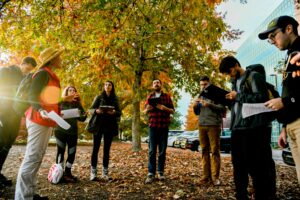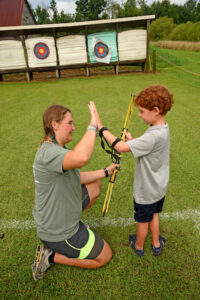Summer Extension Internship
go.ncsu.edu/readext?828254
en Español / em Português
El inglés es el idioma de control de esta página. En la medida en que haya algún conflicto entre la traducción al inglés y la traducción, el inglés prevalece.
Al hacer clic en el enlace de traducción se activa un servicio de traducción gratuito para convertir la página al español. Al igual que con cualquier traducción por Internet, la conversión no es sensible al contexto y puede que no traduzca el texto en su significado original. NC State Extension no garantiza la exactitud del texto traducido. Por favor, tenga en cuenta que algunas aplicaciones y/o servicios pueden no funcionar como se espera cuando se traducen.
Português
Inglês é o idioma de controle desta página. Na medida que haja algum conflito entre o texto original em Inglês e a tradução, o Inglês prevalece.
Ao clicar no link de tradução, um serviço gratuito de tradução será ativado para converter a página para o Português. Como em qualquer tradução pela internet, a conversão não é sensivel ao contexto e pode não ocorrer a tradução para o significado orginal. O serviço de Extensão da Carolina do Norte (NC State Extension) não garante a exatidão do texto traduzido. Por favor, observe que algumas funções ou serviços podem não funcionar como esperado após a tradução.
English
English is the controlling language of this page. To the extent there is any conflict between the English text and the translation, English controls.
Clicking on the translation link activates a free translation service to convert the page to Spanish. As with any Internet translation, the conversion is not context-sensitive and may not translate the text to its original meaning. NC State Extension does not guarantee the accuracy of the translated text. Please note that some applications and/or services may not function as expected when translated.
Collapse ▲
Dr. Steph Jeffries (left) teaches tree identification during a dendrology class outside Jordan Hall.
The United States is currently experiencing incongruity among workforce skills needed by college graduates, formal education curricula, and the number of college graduates needed for certain jobs. In fact, 60,000 highly technical job openings in agriculture and related fields are expected annually, yet only 35,000 graduates are available (USDA, 2015). Furthermore, experts have stressed the need for workforce preparation to address impending challenges to food and agriculture (Mercier, 2015).
NC State Extension’s Summer Internship Program provides a solution to these challenges by preparing future Extension professionals.
Overview
In North Carolina, Extension professionals work in all 100 counties and the Eastern Band of the Cherokee Indians. Nationwide, more than 15,000 Extension professionals are working to address society’s needs. Numerous countries and international development programs need Extension professionals. All of this means that opportunities abound for students who pursue the Extension Education field.
In 2021, 24 Extension internships were provided across North Carolina, selected from 155 applicants representing 28 colleges and universities. Interns assisted Extension Agents through programs such as Master Gardener℠ volunteers, pesticide training, diabetes cooking classes, and 4-H livestock projects. Extension internships offered a first-hand view of Extension careers, County Extension Center operations, and community engagement.
Objectives
Extension internships emphasized Extension careers while exposing interns to careers in agriculture, food systems, nutrition, youth development, community development, family and consumer sciences, natural resources, and environmental science. Interns were paid $4800 for 10 weeks of work. Major objectives were for interns to:
- Gain knowledge about Extension careers,
- Develop rich job experiences, and
- Help deliver solutions to address local needs.
Community-Based Education
Internships provide experiences in agriculture and food, health and nutrition, and 4-H youth development programs.
Serving People
Our internship program emphasizes that Extension careers are for people with a
passion for serving families, farmers, youth, and communities.
Interns Develop Competencies
An end-of-program survey was used to understand interns’ perceptions of competencies for career readiness and interest in a Cooperative Extension Career. Of the 24 interns, 19 completed the survey (79% response rate).
Interns were asked what knowledge, skills, and experiences they gained through the internship that would be useful in the future.
“I learned how to maintain an honest and open relationship with my employer and co-workers.” – Summer 2021 Intern
“I do feel like I gained a significant level of skill in community leadership and development.” – Summer 2021 Intern
“I gained communication skills; more knowledge of agriculture; how to work with the community; balance work and home life; and how to work with people’s interests. – Summer 2021 Intern
“I have gained knowledge about attending professional business meetings, how to adjust your plan of action when things do not go as planned, and how to work with people from many backgrounds.” – Summer 2021 Intern
“I feel much more confident in my ability to learn fast and compete in the job market.” – Summer 2021 Intern
Increasing Interest in Extension Career Pathways
Among Extension Interns –
- 31% increase in being very or extremely interested in pursuing a career in Extension.
- The percentage of interns who were very or extremely interested in pursuing a career in Extension increased from 32% before the internship to 63% after the internship.
Real Skills for the Workplace
Interns reported that their internship helped them to develop the competencies identified by the National Association of Colleges and Employers (2020) as indicating career readiness.
- Digital Technology: “I increased my ability to work with unfamiliar technology (e.g., Canva, 4-H Online, etc.).”
- Career Management: “I feel more prepared now than I did before to enter into a career related to Extension.”
- Professionalism/Work Ethic: “I feel much more confident in my ability to learn fast and compete in the job market.”
- Oral/Written Communication Skills: “My role in Extension involved producing a weekly radio spot to promote an event or provide information on programs offered. This allowed me to work on my communication skills. I also learned the importance of providing accommodations including offering closed captioning.”
- Critical Thinking/Problem Solving: “Learning…..how to provide answers to plant and farming questions to different growers and homeowners.”
- Leadership: “I was able to work with people who had both similar and different personality and leadership types. One of my favorite opportunities I had through the internship was being able to plan and help with programing for people of all ages and families.”
- Teamwork/Collaboration: “I experienced one of the most professional and compassionate workplaces I have ever been a part of. I was met with kindness from everyone I had the opportunity to work with, and gained valuable experience through farm visits, educational video production, job shadowing, etc.”
Perceptions from County Extension Directors
An end-of-program survey was used to understand County Extension Directors’ perceptions of the internship program including the performance of the intern in their county. Of the 24 County Extension Directors, 21 completed the survey (88% response rate).
County Directors were asked about the benefits of the internship program beyond those experienced by the intern. Among County Extension Directors –
- 95% indicated completion of projects was a major benefit for the County Extension Center.
- 90% indicated a source of employees to address a specialized need or project.
- 90% indicated a temporary source of labor for major projects.
- 57% indicated the opportunity to evaluate potential employees.
County Directors were asked about program and intern quality. County Extension Directors agreed or strongly agreed to the following statements –
- 100% would participate in the internship program in the future.
- 95% were impressed with the overall quality of our intern applicant pool.
- 90% indicated that the intern understood NC State University’s Land Grant Mission.
- 90% would re-hire their 2021 intern.
“I have no recommendations for improving the Internship Program but want to express how much I appreciate and value it. Two of [our] interns have gone on to work as agents with N.C. Cooperative Extension. Both of these young agents are doing a tremendous job and credit the Internship Program for their interest in working for Extension.” – County Extension Director
“I think the process is great. This is my fourth year with an NC State Extension intern, and she was great. Honestly, she helped boost employee morale after 15-17 months of COVID-19. She was very optimistic and helped us accomplish a lot.” -County Extension Director
“This is a wonderful program that benefits Extension greatly.” – County Extension Director
90% of County Extension Directors reported they gained new knowledge and/or skills from their intern.
“Extension makes a positive difference in the community every day. We provide educational programs that connect communities with research-based information. Our internship program is another way we help prepare students for challenging and rewarding careers.” – Dr. Rich Bonanno; Associate Dean, NC State College of Agriculture and Life Sciences and Director, NC State Extension
How We Recruited Interns
We sought students whose academic background was relevant to Extension. Our major recruitment strategies were (a) sharing fact sheets and invitations with undergraduate coordinators in all agriculture and life sciences departments, (b) recruiting in the NC State University Talley Student Center, (c) using the NC State University electronic billboard system, and (d) contacting faculty and career centers at other institutions.
Learn More
- NC State Extension Summer Internship Program
- NC State Extension
- Agricultural and Human Sciences
- College of Agriculture and Life Sciences
References
Mercier, S. (2015). Food and agricultural education in the United States. Retrieved from the AGree website.
National Association of Colleges and Employers (2020). Career Readiness Defined.
USDA (2015). Employment opportunities for college graduates in food, agriculture, renewable natural resources, and the environment.
Contact:
Dr. Joseph L. Donaldson, PhD, Associate Professor and Extension Specialist, Department of Agricultural and Human Sciences, coordinates the Extension Summer Internship Program.
- Phone: 919-515-1758
- Office: 202 Ricks Hall
- Email: joseph_donaldson@ncsu.edu
NC State University promotes equal opportunity and prohibits discrimination and harassment based upon one’s age, color, disability, gender identity, genetic information, national origin, race, religion, sex (including pregnancy), sexual orientation, and veteran status.




